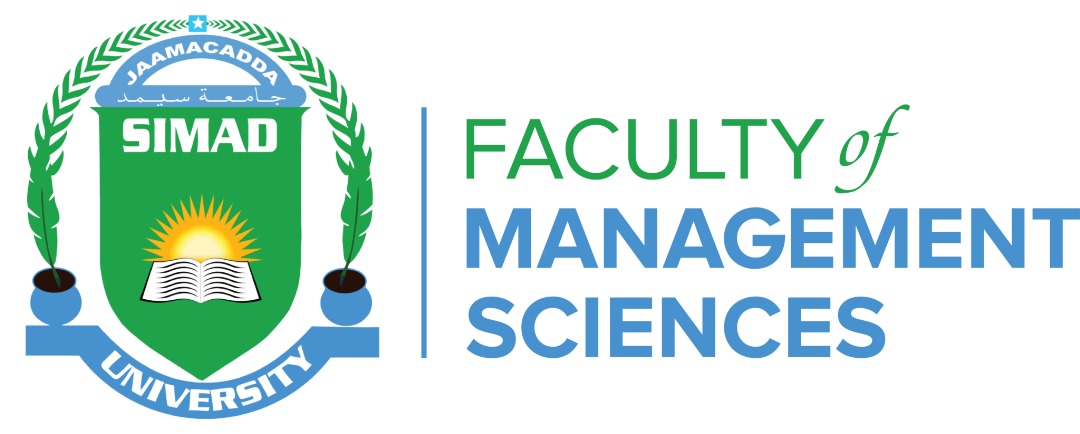Business Administration
Introduction
The demand for business management graduates with specialized skills in the different management functions has increased with the mushrooming of both the private and public sectors in Somalia. The globalization of production and markets in the world economy has necessitated that business schools train and nurture business managers for emerging economies. An SU business administration graduate is trained to go into various careers, including management, marketing, human resources management, entrepreneurship, organizational development, and logistics management, among many others.
Program Goals
The program seeks to promote knowledge and awareness of business principles, real world perspectives; analytical and logical thinking, problem solving, communication skills and team work; scholarship; foster excellence in teaching; acquire and disseminate business and management knowledge; and produce graduate in Business Administration who possess the attributes and skills that are needed to thrive in a technological and knowledge-based economy.
The business administration program is designed for students who wish to pursue careers in government, business operations, and managerial positions in Non-Governmental Organizations.
Program objectives
Students who complete the SIMAD B.S. in Business Administration will be fully rounded, skilled individuals prepared for the challenges of public sector and industry management. The Business Administration degree at SIMAD serves the following main objectives:
- To competently prepare, analyze, and interpret various information that impacts the global marketplace, including environmental, financial, economic, and socio-political information.
- To apply sound management principles and practices to productivity challenges in both public and private areas and an increasingly multi-cultural environment.
- Offer skills necessary to identify, measure, gather, analyze, interpret information and communicate competently, apply technology to public and private sector challenges.
- To challenge and inspire students to seek knowledge and viable solutions for challenges in today’s society and the future.
- To develop public and business managers who serve society within sound ethical and moral boundaries.
- Be competent to pursue graduate and professional studies in business and management anywhere in the world.
Career Opportunities in Business Administration
With a degree in business administration, students can pursue the following careers:
Business manager, Operations Manager, Executive director, Sales Manager, Customer Service Manager, Business analyst, Benefits administrator, Department administrator, marketing manager, Retail Manager, Billing Supervisor, human resources manager, entrepreneurship, Quality Control Manager, organizational developer, logistics manager, bank manager, among many others.
- Completion of secondary school with a minimum overall average of 50%
- Should bring the original and a copy of the secondary school certificate
- Should bring six (6) passport-size photos with a white background
- You should bring the original copy of a letter of good conduct issued by your secondary school
- You should bring a sponsorship letter from your guardian
- Should successfully pass an admission interview and/or test
- Pay non-refundable Processing and ID card fees of USD 50 (bank draft)
UNIVERSITY COURSES
- English I
Fundamentals of Computers
Arabic Language I
- Arabic Language II
- Islamic Studies I
- Islamic Studies II
- Study Skills
- English II
- Computer Applications and Technology
- Principles of Management
- Communication Skills
- Research Methodology
- Critical Thinking
- Somalia Studies
- Conflict Resolutions
- Graduation Project
FACULTY COURSES
- Commerce
- General Mathematics
- Business Mathematics
- Principles of Accounting I
- Principles of Accounting II
- Introduction to Business Org
- Cost Accounting
Business Statistics I
Business Statistics II
- Business Law
- Microeconomics
- Macroeconomics
- Introduction to Research Methodology
- Principles of Marketing
- Principles of Finance
- Human Resource Management
- Quantitative Analysis in Decision Making
SPECIALIZATION COURSES
- Organizational Behavior
- Business Values and Ethics
- Managerial Accounting
- Principles of Procurement
- Entrepreneurship
- Public Administration theory and practice
- Fundamental of Digital Marketing
- NGO Management
- Money and Banking
- Project Planning and Management
- Public Finance
- Strategic Management
- Risk Management
- Negotiation Skills
- Management Information System
- International Business
- International Managerial Finance
- Production and Operation Management
- Public Relations
- Total Quality Management
Full time: 5 Years
Tuition Fee: $315.00
Additional Charges: $30.00
Total per Semester: $345.00
This policy applies to all students, these include: part-time and full-time for both undergraduate and postgraduate and any other person enrolled as a student at the University:
Option one: At the beginning of the semester, all semester fees can be paid in full.
Option two: At the beginning of the semester, students should pay 30% of semester fees before he/she registers for the class. In the second installment, 40% of the semester fees should be paid before the midterm exam. The remaining 30% of the semester fees should be paid before the final exam.
After payments of second and third installments, students are eligible to get their clearance cards for midterm and final exams.
Fees Collector officer will be responsible to check fees default when he/she gets a report from the head of the cash unit.
SU will not refund any fees paid unless the student has no remaining semester.
Students and sponsors who unintentionally or intentionally deposit fees will not be refunded but will be forwarded to the next semesters.
Upon graduation period, all extra fees balance should be refunded to the students.
Any student who temporarily or permanently breaks his/her study can request an extra fee refund.
Head of Cash Unit should check the activities of the sponsors.
Bank Accounts
Premier Bank: 20300001001
Dahabshiil: 1822
Salam Bank: 30027598
Idman Community Bank: 7401005
IBS Bank: 1820
The SU academic year consists of 42 weeks split into two semesters of 18 weeks each, the first beginning in August.
